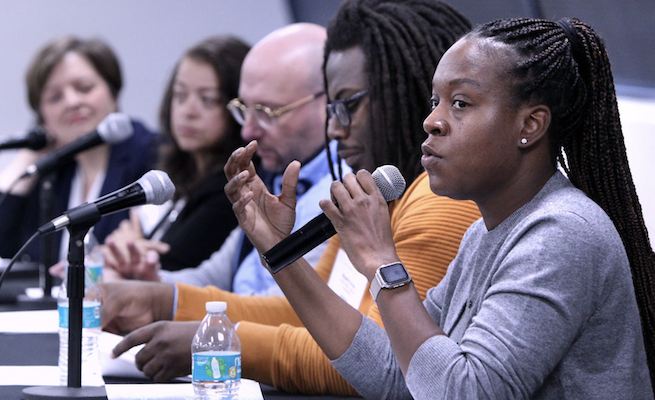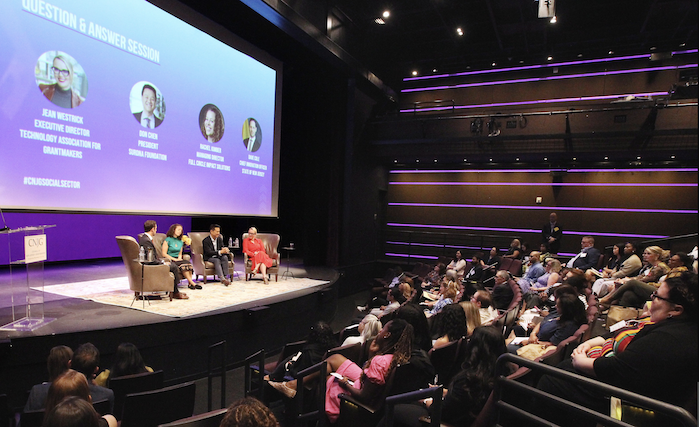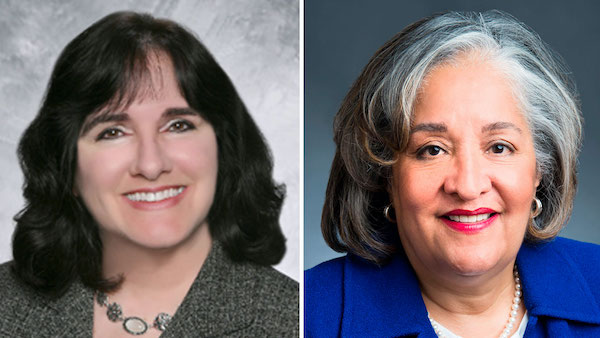Site Search
- resource provided by the Forum Network Knowledgebase.
Search Tip: Search with " " to find exact matches.
How can being more transparent about your philanthropy strengthen your relationships and build trust with grantees and partners?
The annual Trust in Nonprofits and Philanthropy Report showed that 57 percent of Americans trust the nonprofit sector—much higher than the government, media, or the business sector. Yet, only 33 percent have trust in the philanthropic sector (primarily private foundations and high net-worth individuals). Why is this and how can family philanthropy increase this trust?
By prioritizing transparency, families can grow trusting relationships with the communities and organizations that they support, be more accountable donors, and ultimately enhance the effectiveness of their philanthropic efforts.
Cost: This event is free for CNJG Members who are family foundations.
Other types of foundations are ineligible to join this webinar.
This program is a CNJG membership benefit for family foundation members, including staff and trustees, in partnership with the National Center for Family Philanthropy.
The most constant factor in the world today – is change. Sometimes it seems like no matter how well prepared we think we are, unexpected factors keep shifting the road to success, causing roadblocks to constantly pop up to challenge us. And, with the onslaught of what seems like a “natural disaster a week” as well as other emergencies, how does corporate philanthropy respond in a meaningful and timely manner? This session will explore the tools needed to be successful in addressing the needs of our communities as we navigate the changing world. We invite you to join our next virtual meeting of the NJ Corporate Philanthropy Network where Chicago’s Lisa Dietlin, President and CEO of the Institute of Transformational Philanthropy, will provide us with practical tips on how to successfully handle unexpected challenges that seem to face us more regularly in today’s environment.
Cost: Free for CNJG Members; $75 for Non Member Grantmakers
This program is only open to staff and trustees from grantmaking organizations.
Webinar Video
The Camden Funders Affinity Group serves as a vehicle for funders to connect, learn, and share updates about initiatives throughout the city. To help broaden the voices and perspectives in these conversations, we’re excited to continue dedicating a portion of each to hearing directly from leaders doing important work across Camden.
Join fellow CNJG members and the Camden Funders Affinity Group for a very special in-person and lively discussion with the team from Camden Community Partnership. Building on an over 40-year history, Camden Community Partnership continues to advance its mission to serve as a catalyst for the preservation and growth of a vibrant Camden, by facilitating high-quality urban redevelopment projects in the city.
In the first half of the meeting, President/CEO, Dana Redd and her team will share updates on their current priorities, insights into opportunities they see across the city, and participate in a Q&A discussion with the Camden Funders. In the second half of the meeting, we’ll reflect on the team’s remarks, share updates on our current initiatives, and identify potential speakers & topics for future meetings. Light refreshments will be served.
Cost: Free for CNJG Members; $75 for Non Member Grantmakers
This program is only open to staff and trustees from grantmaking organizations.
The Inclusive Growth ScoreTM provides local planners, governments and impact investors with a clear, simple view of social and economic indicators for any census tract in the United States.
Explore how philanthropy can empower organizations led by people of color, advocate for structural change, and confront the impacts of white dominant culture during COVID-19.
With the ongoing spread of coronavirus, protests demanding racial justice, and new data confirming the racial inequity of the pandemic – action is needed now. The social sector must acknowledge and actively work against the embedded racism in a range of systems, including healthcare, employment, education, housing, immigration, and criminal justice.
During our COVID-19 Funders Briefing Series I, Dr. Denise Rodgers from Rutgers University and Bob Atkins of New Jersey Health Initiatives discussed how philanthropy can respond to the systemic racism that underlies the disproportionate impact of COVID-19 on Black communities. This webinar will expand on those ideas to offer additional strategies and examples of how philanthropy can create a more equitable New Jersey during recovery and beyond.
We’ll hear from Ryan Haygood, President and CEO of the New Jersey Institute for Social Justice and Pat Eng, President and CEO of Asian Americans/Pacific Islanders in Philanthropy (AAPIP).
Topics will include:
- Actions taken to center equity during the pandemic.
- The disproportionate impact of COVID-19 on the physical, mental, and financial well-being of communities of color.
- How philanthropy can support organizations led by people of color in the fight for social justice.
Cost: Free for CNJG Members. $50 for Non Member Grantmakers
Webinar Video
The New Jersey State Council on the Arts awarded more than $35.6 million in grants to support more than 700 arts organizations, projects, and artists throughout the state. The grants were approved at the Arts Council's 55th Annual Meeting, held virtually. The awards announced today were part of the largest state appropriation the Council has ever received in its 55-year history – $31.9 million as part of the state budget approved by Governor Murphy last month. Today’s grant awards also included $7.5 million in Coronavirus Relief Funds, which were signed into law by Governor Murphy earlier this year as part of a multi-bill package aimed at economic recovery.
Secretary of State Tahesha Way addressed attendees at the meeting, commending their creativity and resiliency during the pandemic. "The innovation New Jersey’s arts community has shown over these last 16 months is absolutely awe-inspiring,” said Secretary Way. “The arts have been a crucial source of healing and connection throughout the pandemic, and I am proud to work closely with the State Arts Council as they lead the field with responsive grants and services so people can continue to enjoy and engage with New Jersey arts.”
According to a collaborative study of the arts sector, led by ArtPride NJ, New Jersey nonprofit arts organizations have lost more than $100 million and counting due to pandemic-related closures, cancellations, and lost contributed and earned revenue. When the arts sector is open and thriving, it generates more than $660 million in economic activity statewide, employs nearly 22,000 workers, and engages more than 8.3 million people who stay in hotels, and eat and shop locally. For more on the important role the arts play in recovery, visit KeepJerseyArtsAlive.org.
“We are grateful to Governor Murphy and the legislature for this monumental increase in funding and for recognizing the need for robust public support of the arts right now,” said Council Chair Elizabeth Mattson. “This funding is not only vital to ensuring the arts can continue to move forward and innovate, but will support important work to foster a more equitable and inclusive arts community. We know there is still much work to be done, and we look forward to working alongside our partners and colleagues in the field as we embark on a new chapter together.”
The Healthcare Foundation of New Jersey (HFNJ) is pleased to announce that it has awarded $2,886,777 to twenty-one New Jersey non-profit organizations in the third quarter of 2022.
The largest grant this cycle is a one-million-dollar award to Summit’s Overlook Medical Center to modernize and expand the hospital’s maternity health center. The redesigned unit will be equipped to ensure safe, effective, and family-centered care in a state-of-the-art environment, and will be a key part of Overlook’s broader efforts to equitably service their growing population of diverse and high-risk patients. This aligns with The Healthcare Foundation of New Jersey’s priority of supporting programming that facilitates greater health equity for all. The renovation will create 37 private maternity rooms and four high-risk rooms that will enable birthing mothers and their families to be together in privacy and will involve moving the entire mother/baby floor so it is adjacent to the neo-natal intensive care unit.
Several other projects awarded this cycle also address reproductive and maternal health. Two local Planned Parenthood organizations - Planned Parenthood of Northern, Central, Southern NJ and Planned Parenthood of Metro New Jersey – received two grants totaling $361,807 to support patient navigators, who will help assure excellent reproductive and health care for all patients in need of service. Requests for assistance from Planned Parenthood have increased dramatically in the past several months. A $109,623 grant to the New Jersey Health Care Quality Institute will create a training program to help perinatal community health workers identify the signs of mental illness among patients and connect them to support services.
“This quarter The Healthcare Foundation of New Jersey received and vetted a record number of grant proposals, which is a reflection of the urgent and growing needs in the communities we serve,” said Michael Schmidt, Executive Director and CEO of The Healthcare Foundation of New Jersey. “In addition to maternal and reproductive health, the projects we supported this quarter address an array of human needs – from dental care for children, veterans, and Holocaust survivors to access to nutritious foods to helping children receive quality mental health care in the wake of the pandemic, which remains a continuing focus of our grantmaking in 2022.”
Inspiring Change through Leadership: Maximizing Philanthropic Impact
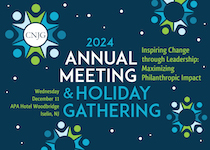 Wednesday, December 11, 2024 - 9:00am to 3:00pm
Wednesday, December 11, 2024 - 9:00am to 3:00pm
Luncheon, Keynote Presentation & Workshop
Location: APA Hotel Woodbridge, 120 Wood Ave S, Iselin, NJ 08830
The Council of New Jersey Grantmakers thanks everyone who attended our 2024 Annual Meeting & Holiday Gathering. On Wednesday, December 11, over 130 Council members and special guests gathered to celebrate the holiday season, welcome new CNJG members, convene our annual business meeting, and feature a dynamic discussion related to the vital work of philanthropy.
The Council’s 2024 Annual Meeting & Holiday Gathering was the place where CNJG members and New Jersey’s philanthropic community came together to share ideas about the important work they’re doing. It also provided a valuable opportunity to connect with colleagues.
This year’s theme, Inspiring Change through Leadership: Maximizing Philanthropic Impact, featured keynote speaker Amalia Brindis Delgado of the Panta Rhea Foundation.
The Annual Meeting included a workshop that explored the New Jersey Principles for Philanthropy. An overview of the Principles was presented, followed by a panel of fellow CNJG members who discussed how they are already using the Principles within their organizations. Attendees also had time to discuss how they could leverage the New Jersey Principles for Philanthropy to make changes within their own organizations.
Annual Meeting Photos
Empowering the Future: Harnessing AI and Data for Philanthropic Social Impact
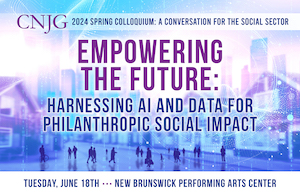
Date: Tuesday, June 18
Time: 9:30 a.m. to 3:30 p.m.
Location
New Brunswick Performing Arts Center
Arthur Laurents Theater
11 Livingston Ave, New Brunswick, NJ 08901
Directions and Parking
On Tuesday, June 18, 2024, the Council of New Jersey Grantmakers held the Spring Colloquium – A Conversation on the Social Sector at the New Brunswick Performing Arts center. This year, we explored the impact of AI and data on philanthropy and the nonprofit sector. Our panel discussion will brought together multiple perspectives to explore how AI can enhance problem-solving without losing human connections, how it affects equity, and how philanthropy has engaged with AI for funding initiatives.
The Technology Association of Grantmakers’ new Executive Director, Jean Westrick, moderated our esteemed panel that included Don Chen, President, Surdna Foundation; Rachel Kimber, Full Circle Solutions; and Dave Cole, State pf New Jersey’s Chief Innovation Officer.
After the panel, Jean Westrick, TAG, facilitated an afternoon session on an AI Framework for Philanthropy. Additionally, the Community Resource Exchange presented an afternoon session on an AI Guide for Nonprofits facilitated by their CEO, Tiloma Jayasinghe, CEO and Jared Carroll, Senior Consultant.
CNJG’s spring colloquium brought together New Jersey grantmakers and nonprofits to connect with each other, Increase their knowledge, learn best practices, find opportunities for collaboration, and to be introduced to new ideas.
Conference Photos
In this arts briefing, Nadia Elokdah, Vice President and Program Director for Grantmakers in the Arts, will discuss the unique opportunity for arts grantmakers to support advocacy and influence policy through their funding decisions and why the arts should be included in decision-making processes. She will also cover the importance of arts funding in building narrative power and driving cultural change. Vanessa Ramalho, Director of External Relations of ArtPride New Jersey, will highlight the challenges faced by arts and cultural organizations in New Jersey and their intersections with community issues relating to the ongoing changes in federal policy. She will also share how ArtPride New Jersey is leveraging its statewide reach to develop collaborative advocacy strategies to influence and help shape policies informed by the needs and voices of the arts sector and the communities they serve. Vanessa will explore ways that funders might shift their focus and priorities to better meet the needs of organizations that are navigating increasing financial uncertainty as a result of federal policy changes.
Nadia Elokdah is an urbanist and design strategist with more than a decade working at the intersection of public systems and cultural practice. She currently serves as Vice President & Director of Programs at GIA. Most recently she served as special projects manager with the New York City Department of Cultural Affairs coordinating the City’s monuments commission. Prior, she served as coordinator in the development of the City’s first cultural plan, CreateNYC, in which she coordinated and led hundreds of engagements with a broad cross-section of the public, as well collaborating in the writing and production of the plan. She is devoted to civic engagement through culturally responsible, inclusive, and equitable design practice, exemplified in collaborations with the International Design Clinic, in.site collaborative, and Monuments Lab. Nadia is a trained architect and designer, researcher, professor, and published author, including Identity Crisis, a cultural exploration of urban planning through the hammam. She currently serves as steering committee member of the Women of Color in the Arts (WOCA) Non-Black POC Solidarity! into Action Committee, National Coalition for Arts Preparedness & Emergency Response (NCAPER) Programming Working Group, and an advisory board member for Unsettled.
Vanessa Ramalho, Director of External Relations, supports ArtPride’s advocacy and government affairs work, leading efforts to move forward legislative priorities that support the sustainability of the arts in New Jersey. Vanessa also builds relationships with constituents throughout the state — from community members to arts organizations, and local and state representatives — to support the cultivation of a thriving arts ecosystem. With nearly 20 years of experience in the nonprofit arts & cultural sector, Vanessa has led community education, fundraising, and grassroots advocacy projects across a range of organizations, including the Sadie Nash Leadership Project, the Asian Pacific Islander Coalition on HIV/AIDS (APICHA), Project KISS of New York Presbyterian Hospital, The Princeton Ballet School, the Asian Arts Initiative, and the Center for Babaylan Studies.
Cost: Free for CNJG Members; $75 for Non Member Grantmakers
This program is only open to staff and trustees from grantmaking organizations.
Programs in this Series:
March 13: Making Sense of Federal Policy: Understanding What it Means for NJ: Immigration
March 20: Making Sense of Federal Policy: Understanding What it Means for NJ: Health
March 27: Making Sense of Federal Policy: Understanding What it Means for NJ: Environment
April 3: Making Sense of Federal Policy: Understanding What it Means for NJ: Education
April 10: Making Sense of Federal Policy: Understanding What it Means for NJ: Housing
April 17: Making Sense of Federal Policy: Understanding What it Means for NJ: Media & Journalism
April 24: Making Sense of Federal Policy: Understanding What it Means for NJ: Arts
Webinar Video
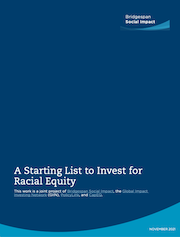
This work is a joint project of Bridgespan Social Impact, the Global Impact Investing Network (GIIN), PolicyLink, and CapEQ.
Since the social unrest over racial injustice in the summer of 2020, philanthropists, corporations, and impact investors across the United States pledged to invest billions of dollars to advance racial equity. However, recent scrutiny of those commitments reveals that the majority of those dollars remain on the sidelines.
A common hypothesis for the shortfall is the lack of investable “shovel-ready” opportunities. But Bridgespan Social Impact has formally and informally advised organizations seeking to invest for racial equity over the years, and found that hypothesis to be patently untrue. To make the case, Bridgespan is publishing this list of racial-equity funds that emerged from our experience, at the request of multiple funds and potential investors, and alongside the launch of a new racial-equity theme in the IRIS+ family of impact measurement and management guides. It comprises more than 160 funds that explicitly seek to improve the livelihoods of individuals who are Black, Indigenous, and people of color (BIPOC) and their communities. And we’re not done yet.
What is racial-equity investing?
In putting together this list, we chose to characterize “racial-equity investing” as directing capital toward creating equitable opportunities for BIPOC individuals and communities. That often requires shifting decision-making power and redefining risk so that capital flows more freely in service of those opportunities.
Sourcing these funds, we uncovered dozens of creative financing vehicles aimed at building power, creating economic opportunity, and improving livelihoods for communities of color.
This piece captures five key insights to guide organizations as they develop ongoing Measurement, Learning, and Evaluation plans to achieve greater social impact:
- Theory of Change amplifies your impact—helping you focus on the linkages between, and assumptions underlying, your strategies and outcomes.
- Progress toward long-term goals is observable in interim measures.
- Setting targets along the way forecasts your trajectory and provides feedback that tells you if you’re moving in the right direction.
- Impactful measurement needs to align with the rhythm of your work and provide the right data at the right times.
- The payoff of measurement is in the practice, and putting that practice to use greatly increases your odds of success.
When confronted with measurement and evaluation, some turn first to the expensive and time-consuming practice of “gold standard” experimental designs requiring comparison groups to definitively prove whether an intervention delivers the expected results. While measurements of this type are reasonable in certain situations, they are often a stretch for the real world of social innovation and are limited in their timeliness, strategic value, cultural applicability, and validity for measuring the changes sought.
You can get more for less—by deploying measurement based on social science rigor and valuing adaptability and learning. In other words, social innovation is best measured in real time and in ways that can be seamlessly woven into the rhythm of the business cycle and the daily practices of those responsible for funding, managing, and implementing social change.
- The American Express Foundation diversified strategies to build non-profit management skills in its effort to develop diverse talents in the non-profit sector. Some of these efforts include a leadership development program that supports emerging talents from various ethnicities, generations and genders.
- The Baltimore Community Foundation took the first step to educate and inform the foundation internally before sharing its DEI efforts with the community. A shared understanding among internal stakeholders helped align their goals around DEI which made integrating DEI work in the foundation and the community much more effective.
- Access Strategies Fund increased civic participation of diverse communities through equitable grantmaking driven by diverse decision makers and saw dramatic increases in political representation among communities of color.
- The Silicon Valley Community Foundation believes that data can drive equity and publishes data on its website regarding the gender and racial / ethnic diversity of its staff and leadership, and lists the grants it provides to organizations or programs serving ethnically diverse populations.
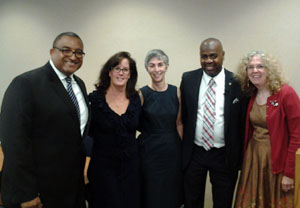
Newark’s 40th Mayor Ras J. Baraka (pictured, second from right) invited the Newark Funders Group to hear his vision for the city at special August meeting. Just 30 days into his term, the Mayor called on the Newark Philanthropic Liaison Jeremy Johnson (far left) to organize a convening with the Newark group, co-chaired by Etta Denk of Bank America (second from left) and Barbara Reisman of the Schumann Fund for New Jersey (third from left). Irene Cooper-Basch (far right), Chair of the Council of New Jersey Grantmakers and Executive Officer at the Victoria Foundation, introduced the Mayor to more than 50 grantmakers who attended the session at the PSEG headquarters in downtown Newark. Rick Thigpen (not pictured), Vice President, State Government Affairs at PSEG, welcomed the Mayor and Grantmakers to the company’s conference center.
Mayor Baraka talked about new interventions for youth at risk and targeting crime in hot spots in the city. He said increased “literacy” would help get to the core of many of Newark’s problems. During the questions and answer period, the Mayor elaborated on his proposed response to the budget, the arts, downtown development, prisoner reentry, early childhood education and the city’s relation to Newark Public Schools. He thanked grantmakers for their contributions to “The Blueprint for a New Newark,” a document of transition recommendations.
The Newark Funders Group is an affinity group of CNJG and meets quarterly. The group’s activities include an active Education Subcommittee, Early Learners Funders Group, and College Access and Success committee.
Joint Statement from CNJG and the Center for Non-Profits
This statement also appeared on NJ Spotlight.
A conversation between two customers in line at a New Jersey supermarket turned ugly when one man denigrated the other with a racial slur and blamed the fellow shopper for the coronavirus pandemic.
With so much else going on these days, it would be so easy to react to such a seemingly minor incident by saying, oh well, these things happen. Times are tough; tempers are short.
But shrugging our shoulders is not an option. Doing so is complicity in a wrongful acts that too often are repeated, over and over. Our silence merely emboldens those who would tear apart the fabric of our society, whether through hate or ignorance – or the extremely volatile mix of the two.
It’s not difficult to connect the dots between “little” incidents and the systemic racism that leads to tragedies like the killing of George Floyd in Minneapolis. When we ignore or accept any examples of people being demeaned over what they look like or where they (or their ancestors) came from, we only open the door for massive abuses and the wrenching reckoning that follows them.
We mustn’t be cowed by fear of being seen as overly sensitive or labeled “politically correct.” This is about being morally and ethically correct in the face of bias and hatred – and that shouldn’t be too much to ask of Americans, regardless of their political party or ideology.
As state Attorney General Gurbir Grewal said recently, “COVID-19 is no excuse for racism, xenophobia, or hate. Discrimination and harassment in violation of New Jersey law remains illegal even if it occurs against the backdrop of a global pandemic." It’s gratifying to live in a state where the top law enforcement officer speaks out this way.
Unfortunately, it also is a state where reported hate crimes are up in recent years. We can’t tolerate such behavior, whether by police, elected officials or “average people.” There is too much at stake for bias to become the new normal.
As the leaders of the major philanthropic and non-profit membership organizations in New Jersey, representing both the wide range of non-profit groups and the multi-faceted funders of those groups, we feel compelled to speak out against the hateful responses we and our members have witnessed in reaction to the COVID-19 Pandemic.
Our country has seen countless examples of selfless sacrifice and good works over the past weeks, both on individual and institutional levels. We are proud that the members our organizations have been leaders in responding to the needs of our community.
But to our distress, some individuals are using the pandemic to put forward their bias and hatred toward their fellow citizens.
Times of crisis bring to the surface, on the part of some people, the need to scapegoat. Often, this takes the form of lashing out at particular groups, stirred up by inflamed rhetoric or more subtle code words or phrases, having no relationship to facts. In this time, there have been verbal and physical attacks against people of Asian and Pacific Islander background, as there were against Muslims after September 11 and against African-Americans and Latinos in countless other instances. This hatred and these attacks must stop.
The non-profit sector is the backbone of our communities, providing assistance and education to a wide range of people, in good times and especially in challenging times. Many of these services are a lifeline to people of all backgrounds, religions, ethnicities and statuses in life.
Non-profit organizations are the vehicle through which people can work together to selflessly assist others. People around the world view the United States as being unique in the breadth and depth of its charitable and philanthropic work, engaging the talents of all individuals, regardless of their economic or social status.
We call upon all people of good conscience in their good work to be alert for hateful words and actions and – always -- to speak out against them, both as individuals and as organizations.
Our language and our actions do matter.
Everyone, and especially people in positions of public trust or prominence, has the obligation to use our works and our lives to assist all in need and to honor the dignity and potential of all those we meet.
We call on not only our own members, but everyone who serves and volunteers in our sector to join us in this effort to speak out against racism and hatred and to exemplify all the best that we know our country is.
Maria Vizcarrondo
CNJG CEO and President
Linda Czipo
Center for Non-Profits CEO and President
William V. Engel
CNJG Board Chair
Gina M. Plotino
Center for Non-Profits Board Chair
The Fund for Women and Girls of the Princeton Area Community Foundation has awarded a record $325,000 in grants to local nonprofit organizations.
This funding is the largest amount awarded in any cycle of the Fund’s more than 20-year history and includes a first-time award for the Liz Gray Erickson Memorial Grant, a 3-year grant given in memory of the Princeton resident who served as the chair of the Fund from 2012 to 2014.
“Thanks to the generosity and commitment of our Fund for Women and Girls members, we’ve awarded more than $1 million in grants to more than three dozen nonprofits in the last five years,” said Jenifer Morack, Fund Co-Chair.
Fund members pool their donations, then recommend grants to be awarded annually to local nonprofits. Isabel Zisk, Fund Co-Chair, said making a gift to the Fund is incredibly effective. Individual donations create a leveraged pool of funding that greatly benefits nonprofits working to impact the well-being of women, girls and communities in our region.
“We do what no individual donor has the expertise, time or access to do,” she said, explaining that the Fund’s Grants Committee members read dozens of applications and conduct site visits with nonprofits. “Because of some very generous gifts, this year, we have the honor of awarding the Liz Gray Erickson Memorial Grant. With her visionary leadership, Liz planted the seeds of our grantmaking focus.”

